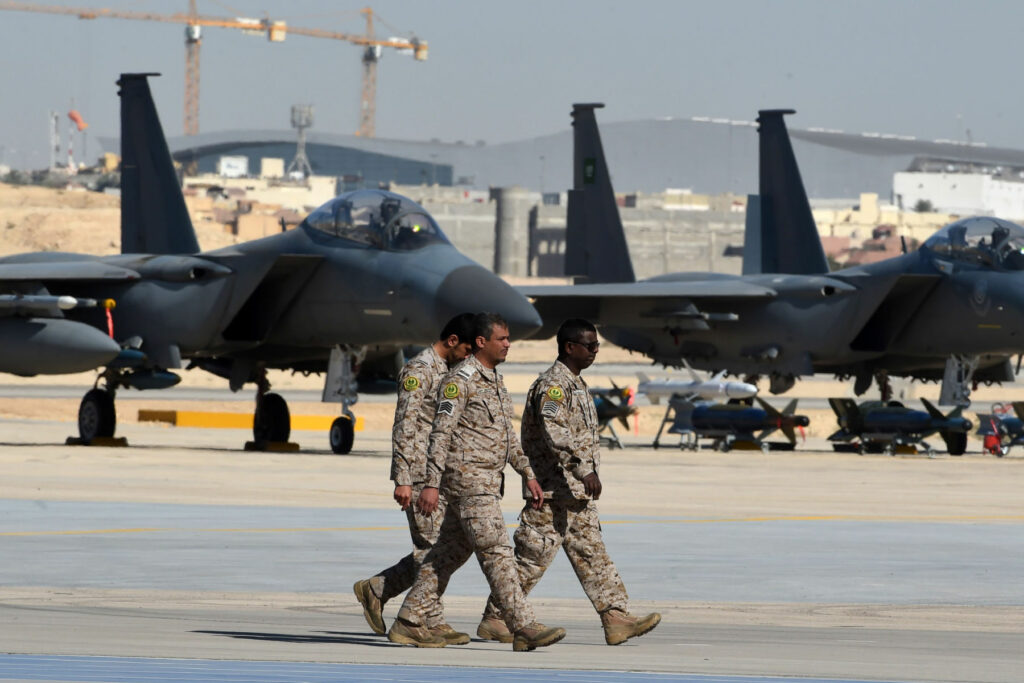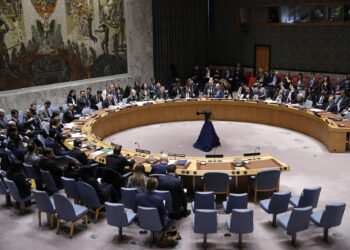Annelle Sheline is a Middle East research fellow at the Quincy Institute. She previously served as a foreign affairs officer at the State Department’s Bureau of Democracy, Human Rights and Labor, before resigning in March 2024 in protest over the Biden administration’s unconditional support for Israeli military operations in Gaza.
Editor's note: This article is adapted from a paper presented at a policy workshop on the proposed U.S.-Saudi security agreement, which DAWN co-hosted with Georgetown University's Alwaleed Center for Muslim-Christian Understanding.
In a televised speech in mid-September, Crown Prince Mohammed bin Salman declared that Saudi Arabia "will not stop its tireless work towards the establishment of an independent Palestinian state with East Jerusalem as its capital. We affirm that the kingdom will not establish diplomatic relations with Israel without that." With this statement, the crown prince, widely known as MBS, appeared to dash the Biden administration's lingering hopes of brokering a landmark normalization deal between Israel and Saudi Arabia.
Based on reporting about the White House's hoped-for "megadeal," Saudi normalization with Israel would have rewarded Riyadh with a U.S. defense agreement and a U.S. pledge to assist in the establishment of a Saudi civil nuclear program. The Biden administration had previously signaled that they might be willing to move forward with a U.S.-Saudi defense agreement even in the absence of normalization with Israel. But MBS's announcement appears to finally kill the possibility of the so-called "grand bargain" that White House advisers Brett McGurk, Jake Sullivan and other senior administration officials had hoped would offer a means of countering China, resolving the war in Gaza and topping former President Donald Trump's Abraham Accords, all in one.
However, that does not mean that a President Kamala Harris or a reelected President Trump wouldn't continue to pursue such a deal. Either one of them could still be driven by the misguided belief that a sweeping agreement for a "strategic partnership" with Saudi Arabia is the best way of combating China's presence in the kingdom, which is likely to remain a key policy goal of any future U.S. administration.
Doubling down on the U.S. commitment to the Middle East in general and Saudi Arabia in particular is the opposite of what Washington should be doing.
- Annelle Sheline
Under the reported terms of this proposed U.S.-Saudi deal, Riyadh would not allow China to expand its military footprint in the kingdom and the Saudis would also agree not to purchase advanced Chinese weaponry. But these U.S. fixations on China overlook the nature of Beijing's relationship to Saudi Arabia, which is primarily driven by economic rather than military ties. China is Saudi Arabia's most important oil customer, consuming about 20 percent of total Saudi oil exports last year. Likewise, after Russia, Saudi Arabia is China's most important source of fossil fuels, as well as China's largest trading partner in the Middle East. This economic relationship is unlikely to change, deal or no deal with Washington.
Doubling down on the U.S. commitment to the Middle East in general and Saudi Arabia in particular is the opposite of what Washington should be doing. Some Americans appear to be under the mistaken impression that the U.S. remains dependent on Saudi oil and therefore must continue to cater to Saudi demands. This view was reinforced by President Biden abandoning his promise to hold Saudi Arabia accountable for its numerous human rights abuses and not meet with MBS, when he traveled to the kingdom in July 2022 in an evident attempt to win back the crown prince's favor. The American public, if they were paying attention, likely saw that as reflecting U.S. dependence on Saudi oil, which was made painfully apparent during the 1973 oil embargo.

Yet since 2018, the U.S. has produced more crude oil than any other country in the world. However, it may be in the interests of the Biden administration, or the next administration in Washington, for Americans to continue to labor under the mistaken belief that the U.S. must keep appeasing Riyadh because of its reliance on Saudi oil. While Saudi Arabia's role in the global oil market remains significant—as evidenced by its decision within OPEC+ to cut oil production following Russia's invasion of Ukraine, against U.S. wishes—the Saudis will not risk their own domestic stability to cut off oil exports to the U.S. or any other country.
In reality, Biden's willingness to bend the knee to MBS was not due to oil, but the geopolitics of the war in Ukraine. In the aftermath of Russia's invasion, Saudi Arabia was unwilling to either condemn Moscow or increase oil production to compensate for the loss of sanctioned Russian oil on the global market. Riyadh remained in close contact with President Vladimir Putin's government but refused calls with Biden. Following that snub, Biden clearly felt he needed to repair the relationship or risk losing the Saudis to Putin. Yet Biden's zero-sum calculus about the Saudi relationship with both China and Russia demonstrates his inability to understand how, in a multipolar world order, countries like Saudi Arabia will maintain relations with all the major powers and successfully play them off each other, as it has clearly done.
Similar to the inability of a U.S.-Saudi deal to have any significant impact on the kingdom's relationship with China, the relationship between Saudi Arabia and Israel, however informal, is already strong behind the scenes. Saudi and Israeli intelligence meet regularly, Saudi Arabia opened its airspace to Israeli flights to the United Arab Emirates following Emirati normalization with Israel, and according to media reports, Netanyahu flew to Saudi Arabia to meet with MBS in 2020. This is partly why the Israeli government has been unwilling to engage in even the charade of making concessions toward the establishment of a Palestinian state, because it would arguably not gain much from Saudi normalization that it does not already have. It would be symbolically significant for the Custodian of the Two Holy Mosques to officially recognize Israel, but Prime Minister Benjamin Netanyahu has other priorities, as he has staked his reputation on his resistance to any steps for a state of Palestine.
America's obsession with military primacy in the Middle East is likely to keep a U.S.-Saudi deal on the table, regardless of who wins in November.
- Annelle Sheline
Instead, Saudi Arabia would be the real winner of normalization with Israel, if it also meant the reward of a security guarantee from the United States, which would very likely have two effects. First, the Saudis, feeling emboldened by a U.S. defense treaty, may decide to behave more aggressively in the region. MBS made rash decisions following his rise to power, most of all the Saudi-led war in Yemen launched in 2015. With the guarantee of U.S. military backing, he might reverse the kingdom's policy of rapprochement with Iran, or reinitiate the brutal war on Yemen, or escalate against other regional actors. Second, as U.S.-designated "major non-NATO allies" in the region, Egypt, Jordan, Israel, Bahrain, Kuwait, and Qatar are likely to also demand similar security commitments from Washington, as is the United Arab Emirates, an increasingly close American partner in the Gulf and occasional rival with Saudi Arabia.
All this would reverse the encouraging trend that has seen members of the Gulf Cooperation Council, fearful that the U.S. security commitment might not be as robust as they had hoped, work toward diplomacy and coexistence with Iran, rather than saber-rattling for war. New American defense treaties and military pledges would likely reinflame those tensions and could potentially drag the U.S. into yet another war in the Middle East.
The past several administrations in Washington have tried to reduce America's commitments to the Middle East. Although MBS's announcement last month appeared to diminish the likelihood of a U.S.-Saudi security pact in the near term, America's obsession with military primacy in the Middle East is likely to keep the deal on the table, regardless of who wins in November.






































